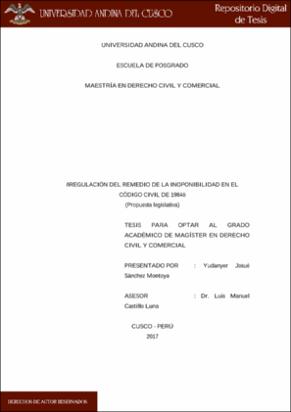| dc.contributor.advisor | Castillo Luna, Luis Manuel | |
| dc.contributor.author | Sánchez Montoya, Yudanyer Josué | |
| dc.date.accessioned | 2017-10-10T19:29:09Z | |
| dc.date.available | 2017-10-10T19:29:09Z | |
| dc.date.issued | 2017-05-19 | |
| dc.identifier.uri | https://hdl.handle.net/20.500.12557/969 | |
| dc.description.abstract | El presente trabajo desarrolla la génesis, la aplicación y las manifestaciones de la inoponibilidad, como una categoría jurídica autónoma de la ineficacia funcional del acto jurídico, tomando en consideración los aportes de la doctrina
especializada, la jurisprudencia y la legislación nacional y comparada.
Del mismo modo, se realiza un minucioso análisis de cuatro supuestos patológicos del Código Civil de 1984 (referidos a la representación, la disposición de bienes sociales por uno de los cónyuges, la venta de bien ajeno y el arrendamiento en copropiedad), donde se identifica la ausencia de legitimidad para contratar - como requisito de eficacia - que desencadena la aplicación de la inoponibilidad como remedio.
Bajo dicho enfoque, se pone en evidencia que dichos supuestos tienen una regulación inadecuada que ocasiona un tratamiento jurisprudencial confuso y contradictorio; escenarios que, a nuestro juicio, pueden ser atendidos coherentemente a través del remedio de inoponibilidad, motivo por el cual se requiere su incorporación legislativa en nuestro ordenamiento jurídico. | es_PE |
| dc.description.abstract | The present work develops the genesis, application and manifestations of unopossable, as autonomous juridical category of the functional inefficacy of the
juridical act, taking into account the contributions of specialized doctrine, jurisprudence, and national and comparative legislation.
In the same way, is carried out a through of four pathological postulations of
the Civil Code of 1984 (referring to the representation, the disposition of social
properties by one of the spouses, the sale of property of others and the rent in co-ownership), where it is identified the absence of the legitimacy to contract - as efficacy requirement - that triggers the application of unopposability as a remedy.
Under this approach, it becomes evident that such postulations have an inadequate regulation that causes confusing and contradictory jurisprudential
treatment; scenarios that, in our opinion, can be dealt with coherently though the remedy of unopposability, which is why its legislative incorporation is required in our legal system. | en_US |
| dc.description.uri | Tesis | es_PE |
| dc.format | application/pdf | es_PE |
| dc.language.iso | spa | es_PE |
| dc.publisher | Universidad Andina del Cusco | es_PE |
| dc.rights | info:eu-repo/semantics/openAccess | es_PE |
| dc.rights.uri | https://creativecommons.org/licenses/by-nc-nd/2.5/pe/ | es_PE |
| dc.source | Universidad Andina del Cusco | es_PE |
| dc.source | Repositorio Institucional - UAC | es_PE |
| dc.subject | Ineficacia | es_PE |
| dc.subject | Invalidéz | es_PE |
| dc.subject | Oponibilidad | es_PE |
| dc.subject | Venta-Bien ajeno | es_PE |
| dc.title | Regulación de la inoponibilidad en el código civil de 1984 (Propuesta Legislativa). | es_PE |
| dc.type | info:eu-repo/semantics/masterThesis | es_PE |
| thesis.degree.name | Maestro en Derecho Civil y Comercial | es_PE |
| thesis.degree.grantor | Universidad Andina del Cusco. Escuela de Pos Grado | es_PE |
| thesis.degree.level | Maestria | es_PE |
| thesis.degree.discipline | Derecho Civil y Comercial | es_PE |


